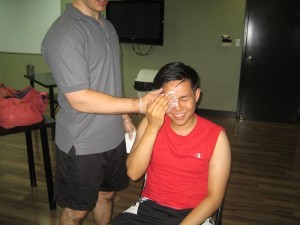A detached retina occurs once the retina is pulled from its underlying support tissues at the rear part of the eye.
Initially, the detachment might only involve a small section of the retina, but if not treated, the entire retina might peel off and the vision is lost. In most cases, only one eye is affected and considered as a medical emergency.
What are the indications?
An individual with a detached retina might experience the following:
- Sudden, brief flashing of light outside the central region of vision. These flashes are likely to manifest once the eye moves.
- Heavy sensation in the eye
- Shadow in the peripheral vision that steadily spreads to the middle of the field of vision
- Straight lines start to curve
Sudden, brief flashing of light outside the central region of vision. - Feeling of a transparent curtain moving over the field of vision
What are the risk factors?
The factors that increases the likelihood for developing a detached retina include:
- Eye injuries
- Genetics
- Severe nearsightedness
- Previous retinal detachment
- Middle or older age
- Previous cataract surgery
- Diabetes especially if not properly controlled
- Eye conditions such as degenerative myopia or uveitis
Management of a detached retina
Surgical intervention is required to detect all retinal breaks to be sealed and lessen the pulling. If not treated surgically, there is a high risk for total loss of vision.
Some of the surgical options include:
- Laser surgery or photocoagulation
- Scleral buckling
- Cryotherapy
- Vitrectomy
- Pneumatic retinopexy
The vision of the individual must return a few weeks after treatment. Remember that there is a minor risk for complications after surgery such as eye bleeding, drug allergies, cataracts, double vision, eye infection and glaucoma.

